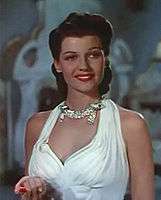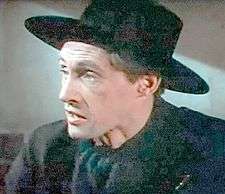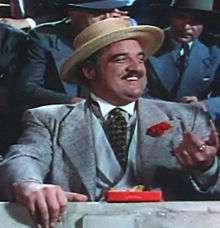Blood and Sand (1941 film)
| Blood and Sand | |
|---|---|
 Original film poster | |
| Directed by | Rouben Mamoulian |
| Produced by |
Associate producer: Robert Kane Producer: Darryl F. Zanuck |
| Written by |
Novel: Vicente Blasco Ibáñez "Sangre y arena" Screenplay: Jo Swerling |
| Starring |
Tyrone Power Linda Darnell Rita Hayworth Alla Nazimova Anthony Quinn Lynn Bari J. Carrol Naish John Carradine |
| Music by |
Alfred Newman Uncredited: Vicente Gómez |
| Cinematography |
Ernest Palmer Ray Rennahan |
| Edited by | Robert Bischoff |
| Distributed by | 20th Century Fox |
Release dates | May 22, 1941 |
Running time | 125 minutes |
| Country | United States |
| Language | English |
Blood and Sand (1941) is a Technicolor film directed by Rouben Mamoulian, produced by 20th Century Fox, and starring Tyrone Power, Linda Darnell, Rita Hayworth, and Alla Nazimova. It is based on the critical 1908 Spanish novel about bullfighting, Blood and Sand (Sangre y arena), by Vicente Blasco Ibáñez.[1] The supporting cast features Anthony Quinn, Lynn Bari, Laird Cregar, J. Carrol Naish, John Carradine and George Reeves.
Rita Hayworth's singing voice was dubbed by Gracilla Pirraga.
There are two earlier versions of Blood and Sand, a 1922 version produced by Paramount Pictures, and starring Rudolph Valentino, and a 1916 version filmed by Blasco Ibáñez himself, with the help of Max André. There is also a 1989 version starring Christopher Rydell and Sharon Stone.
This film was the fourth and last in which Tyrone Power and Linda Darnell worked together, others were; Day-Time Wife (1939); Brigham Young (1940) and The Mark of Zorro (1940).[2]
Plot
As a child Juan Gallardo (Rex Downing – young boy) wants only to become a bullfighter like his dead father. One night he has an argument with the pompous critic Natalio Curro (Laird Cregar) about his father's lack of talent in the bullring. The argument spurs Juan to travel to Madrid and achieve his dreams of success in the bullring. Before leaving he promises his aristocratic sweetheart Carmen Espinosa (Linda Darnell) he will return when he is a success and marry her.
Ten years later Juan Gallardo (Tyrone Power) returns to Seville. He has become a matador and uses his winnings from Madrid to help his impoverished family. He sets his mother (Alla Nazimova) up in a fine house and ends her existence as a scrubwoman. He lavishes money on his sister Encarnacion (Lynn Bari) and her fiancé Antonio (William Montague) so they can open a business and wed. He hires ex-bullfighter Garabato (J. Carrol Naish), who has become a beggar, as his servant. Best of all he is now able to marry his childhood sweetheart Carmen (Linda Darnell) as he had promised.
Juan's wealth and fame continue to grow along with his talents as a bullfighter. Eventually he becomes Spain's most famous and acclaimed matador. Even the once scornful critic Curro now lavishes praises upon Juan and brags that it was he who discovered Juan's talent. Although Juan remains illiterate, doors open to society and he catches the eye of sultry socialite Doña Sol des Muire (Rita Hayworth) at one of his bullfights. His mother attempts to warn Juan that if not careful he will, like his father, end up on a path to destruction but Juan refuses to believe her.

Juan is blinded by the attention his fame has brought and Doña Sol finds it easy to lead him astray. He soon begins to neglect wife, family and training in favor of her privileged and decadent lifestyle. His performance in the bullring suffers from his excesses and he soon falls from his great heights as the premiere matador of Spain. With the loss of fame comes rejection by everyone who was once important to him. Even Carmen casts him off after she learns of his affair. With his fame now gone Doña Sol moves on to new up and coming matador Manolo de Palma (Anthony Quinn), Juan's childhood friend.
After losing everything a repentant Juan begs for forgiveness and is taken back by Carmen. He vows to change but first he must have one final bullfight to prove he is still a great matador. His prayers for one last success, however, are not answered and like his father before him he is gored by the bull. Garabato angrily says the "beast" is the crowd, not the bull. Juan dies in the arms of Carmen as the crowd cheers for Manolo's victory over the bull. Manolo bows to the fickle crowd near the stain of blood left in the sand by Juan.
Main cast and characters
| | Tyrone Power as Juan Gallardo | | Linda Darnell as Carmen Espinosa |
 | Rita Hayworth as Doña Sol des Muire |  | Nazimova as Señora Angustias |
 | Anthony Quinn as Manolo de Palma |  | J. Carrol Naish as Garabato |
 | Lynn Bari as Encarnación |  | John Carradine as El Nacional |
 | Laird Cregar as Natalio Curro |
| Actor | Role |
|---|---|
| Monty Banks | Antonio López |
| Vicente Gómez | Guitarist |
| George Reeves | Captain Vicente Martínez |
| Fortunio Bonanova | Pedro Espinosa |
| Victor Kilian | Priest |
| Adrian Morris as Michael Morris | La Pulga |
| Charles Stevens | Pablo Gómez |
| Cora Sue Collins | Encarnación (as a child) |
| Rex Downing | Juan (as a child) |
| Ann E. Todd | Carmen (as a child) (as Ann Todd) |
Production

Over thirty actresses were considered for the role of Doña Sol, including Gene Tierney and Dorothy Lamour. After Zanuck's original choice, Carole Landis, refused to dye her hair red for the role, Rita Hayworth was cast. Rouben Mamoulian's sets were inspired by the works of painters El Greco, Goya and Velázquez. During shooting he carried paint spray guns in order to be able to alter the color of props at a moment's notice. He also painted shadows onto walls rather than changing the lighting. The film's exterior long shots were filmed in the Plaza de Toros in Mexico City and Mexican bullfighter Carlos Arruza served as the film's technical director. Unlike most films, Blood and Sand was not previewed, but premiered uncut at Grauman's Chinese Theatre in May 1941.[3]
Parodies
- In the same year 1941, the Mexican comedian Cantinflas launched Ni sangre ni arena ("Neither blood nor sand") also about bullfighting.[4]
- Inspired by Blood and Sand's popularity The Three Stooges released a short titled "What's the Matador?" 11 months later, with no story connection except bullfighting.
Awards
The film won an Academy Award for Best Cinematography. It was also nominated for Best Art Direction (Richard Day, Joseph C. Wright and Thomas Little).[5]
Reviews
| Wikimedia Commons has media related to Blood and Sand (film). |
References
- ↑ Vicente Blasco Ibáñez (1919) Blood and Sand p. vii, E. P. Dutton, New York
- ↑ Most Popular Films &c. with Tyrone Power And Linda Darnell
- ↑ Kobal, John (1977). Rita Hayworth: The Time, the Place and the Woman. New York: W.W. Norton & Company. pp. 114–123. ISBN 0-393-07526-5.
- ↑ Pilcher, Jeffrey M. (2000). Cantinflas and the chaos of Mexican modernity. Rowman & Littlefield. pp. 78–79. ISBN 0-8420-2771-8.
- ↑ "Movies: Blood and Sand". New York Times. Sep 30, 2014. Retrieved 2008-12-14.
External links
- Blood and Sand at the Internet Movie Database
- Blood and Sand at AllMovie
- Blood and Sand at the TCM Movie Database